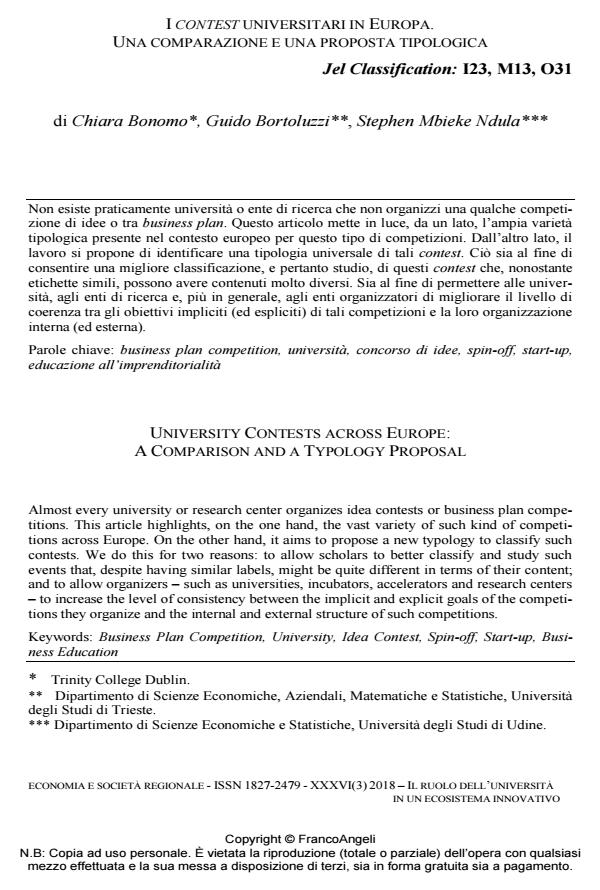University contests across europe: a comparison and a typology proposal
Journal title ECONOMIA E SOCIETÀ REGIONALE
Author/s Chiara Bonomo, Guido Bortoluzzi, Stephen Mbieke Ndula
Publishing Year 2018 Issue 2018/3
Language Italian Pages 14 P. 28-41 File size 444 KB
DOI 10.3280/ES2018-003003
DOI is like a bar code for intellectual property: to have more infomation
click here
Below, you can see the article first page
If you want to buy this article in PDF format, you can do it, following the instructions to buy download credits

FrancoAngeli is member of Publishers International Linking Association, Inc (PILA), a not-for-profit association which run the CrossRef service enabling links to and from online scholarly content.
Almost every university or research center organizes idea contests or business plan competitions. This article highlights, on the one hand, the vast variety of such kind of competitions across Europe. On the other hand, it aims to propose a new typology to classify such contests. We do this for two reasons: to allow scholars to better classify and study such events that, despite having similar labels, might be quite different in terms of their content; and to allow organizers - such as universities, incubators, accelerators and research centers - to increase the level of consistency between the implicit and explicit goals of the competitions they organize and the internal and external structure of such competitions.
Keywords: Business Plan Competition, University, Idea Contest, Spin-off, Start-up, Business Education
- Chesbrough H. (2007). Why Companies Should Have Open Business Models. MIT Sloan Management Review, 48(2): 1-10.
- Astebro T., Bazzazian N., Braguinsky S. (2012). Startups by recent university graduates and their faculty: Implications for university entrepreneurship policy. Research Policy, 41(4): 663-677.
- Backes-Gellner U., Werner A. (2007). Entrepreneurial signaling via education: A success factor in innovative start-ups. Small Business Economics, 29(1): 173-190.
- Başçı E.S., Alkan R.M. (2015). Entrepreneurship Education at Universities: Suggestion for a Model Using Financial Support. Procedia – Social and Behavioral Sciences, 195: 856-861.
- Bonomo C., Bortoluzzi G. (2018). I get by with a little help from my university: A case analysis of entrepreneurial contests across European universities. DEAMS Research Series, 2018/1 -- <http://hdl.handle.net/10077/19844>.
- Fini R., Grimaldi R., Santoni S., Sobrero M. (2011). Complements or substitutes? The role of universities and local context in supporting the creation of academic spin-offs. Research Policy, 40(8): 1113-1127.
- Fini R., Fu K., Mathisen M.T., Rasmussen E., Wright M. (2017). Institutional determinants of university spin-off quantity and quality: a longitudinal, multilevel, cross-country study. Small Business Economics, 48(2): 361-391.
- Gnyawali D.R., Fogel D.S. (1994). Environments for entrepreneurship development: Key dimensions and research implications. Entrepre- neurship Theory and Practice, 18: 43-62. DOI: 10.1177/104225879401800403
- Guerrero M., Urbano D., Fayolle A. (2016). Entrepreneurial activity and regional competitiveness: evidence from European entrepreneurial universities. The Journal of Technology Transfer, 41: 105-131.
- Jansen S., van de Zande T., Brinkkemper S., Stam E., Varma V. (2015). How education, stimulation, and incubation encourage student entrepreneurship: Observation from MIT, IIIT, and Utrecht University. The International Journal of Management Education, 13: 170-181.
- Markman G.D., Gianiodis P.T., Phan P.H., Balkin D.B. (2005). Innovation speed: Transferring university technology to market. Research Policy, 34(7): 1058-1075.
- Nicolaou N., Souitaris V. (2016). Can Perceived Support for Entrepreneurship Keep Great Faculty in the Face of Spinouts?. Journal of Product Innovation Management, 33(3): 298-319.
- Parente R., Feola R., Cucino V., Catolino G. (2015). Visibility and Reputation of New Entrepreneurial Projects from Academia: the Role of Start-Up Competitions. Journal of the Knowledge Economy, 6(3): 551-567.
- Passaro R., Quinto I., Thomas A. (2017). Start-up competitions as learning environment to foster the entrepreneurial process. International Journal of Entrepreneurial Behaviour & Research, 23(3): 426-445. DOI: 10.1108/IJEBR-01-2016-0007
- Premand P., Brodmann S., Almeida R., Grun R., Barouni M. (2016). Entrepreneurship education and Entry into Self-Employment Among University Graduates. World Development, 77: 311-327.
- Russell R., Atchison M., Brooks R. (2008). Business plan competitions in tertiary institutions: Encouraging entrepreneurship education. Journal of Higher Education Policy and Management, 30(2): 123-138. DOI: 10.1080/13600800801938739
- Sánchez J.C. (2013). The impact of an entrepreneurship education program on entrepreneurial competencies and intention. Journal of Small Business Management, 51(3): 447-465.
- Schwartz M., Goethner M., Michelsen C., Waldmann N. (2013). Start-up competitions as an instrument of entrepreneurship policy: the German experience. European Planning Studies, 21(10): 1578-1597.
- Watson K., McGowan P., Cunningham J.A. (2018). An exploration of the Business Plan Competition as a methodology for effective nascent entrepreneurial learning. International Journal of Entrepreneurial Behaviour & Research, 24(1): 121-146. DOI: 10.1108/IJEBR-05-2017-0158
Chiara Bonomo, Guido Bortoluzzi, Stephen Mbieke Ndula, I contest universitari in europa. Una comparazione e una proposta tipologica in "ECONOMIA E SOCIETÀ REGIONALE " 3/2018, pp 28-41, DOI: 10.3280/ES2018-003003